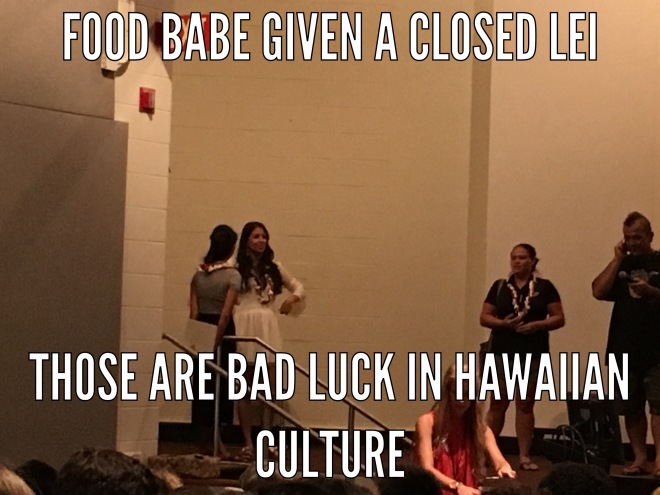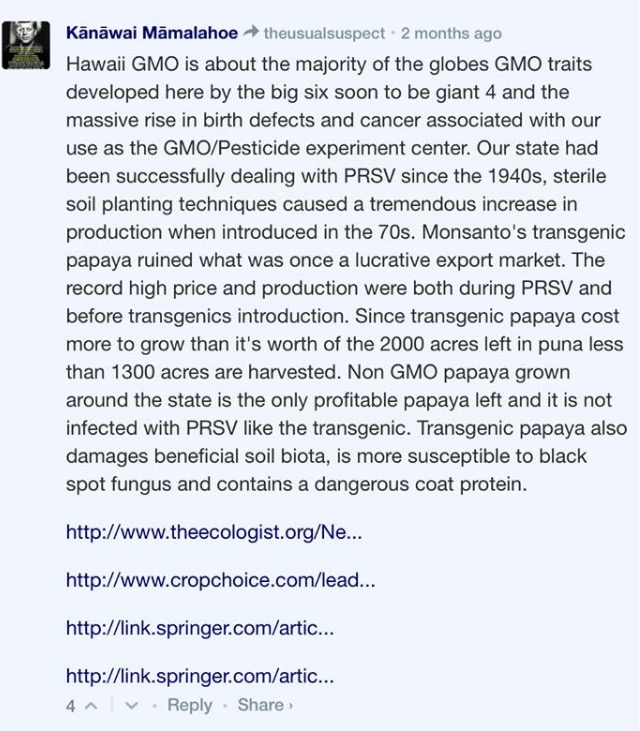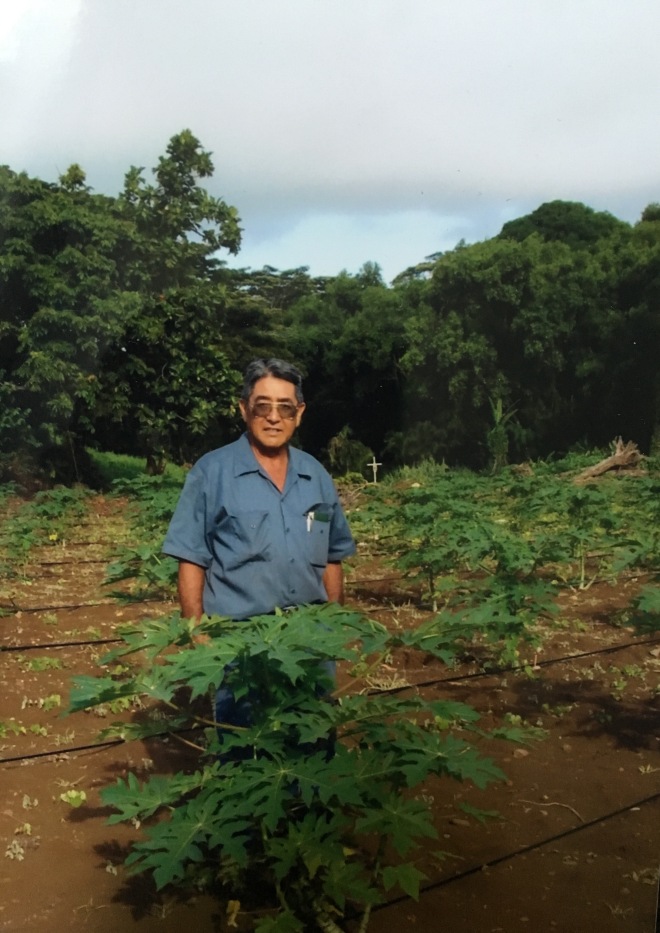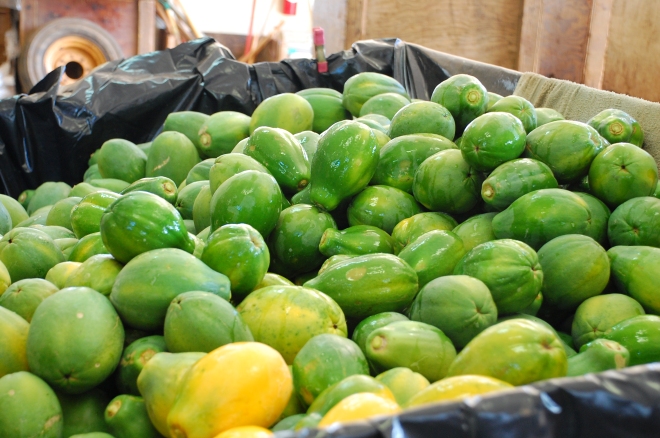Tonight I decided to attend the “Ethics of Eating” sponsored by the Center for Food Safety and featuring Vani Hari, the Food Babe. It was a free event held at the University of Hawaii thanks to a Dr. Robert Perkinson, an American Studies professor, who helped to get this event a venue at the Architecture School Auditorium. I wanted to hear what this “food activist” had to say and see what kind of people attend these events.
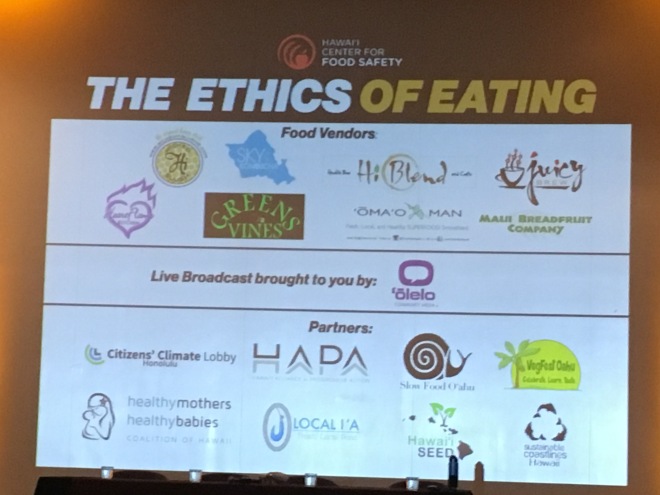
I got there with my friend, Sarah, at 5 pm to check out the True Food Market held out in the courtyard. I decided to wear my March Against Myths I love GMO shirt to distinguish that I wasn’t a true believer. I did get some odd looks but no one approached us which told me the anti-GMO emotional tones must be settling down a bit.
In order to get something to eat, you had to pay $5 to get a bunch of tickets for various vegan foods. I didn’t think that there would be food, so I had gotten a plate lunch from L&L BBQ prior. Not realizing that the event was vegan, I still sat there and ate that piece of unethical, Monsanto grain raised, industrial piece of chicken and some GMO macaroni salad. It smelled delicious but I bet it raised some eyes in the crowd smelling it. I already started the evening showing how unethical I eat apparently.
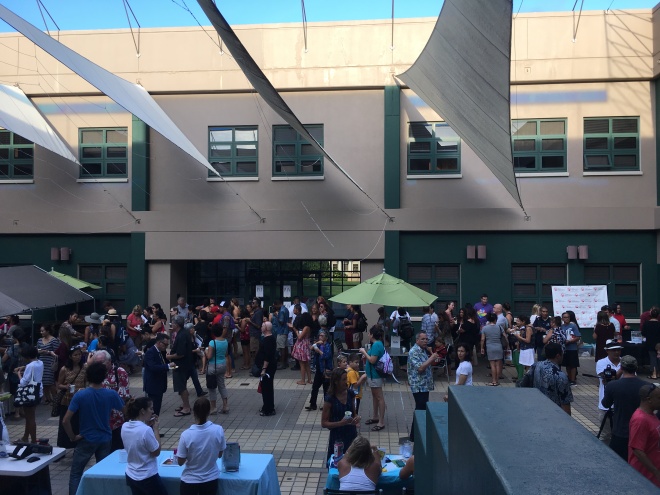
As more people started to gather in, it was fascinating to see so many people crowding into listen to a person who has no background in what she’s talking about. There was an older woman with long scraggly hair and collagen pumped up lips, some Hawaiians, older adults, people of all walks of life there. There were even young kids with their parents joining in too. I estimated that at least 250 came to listen to her.
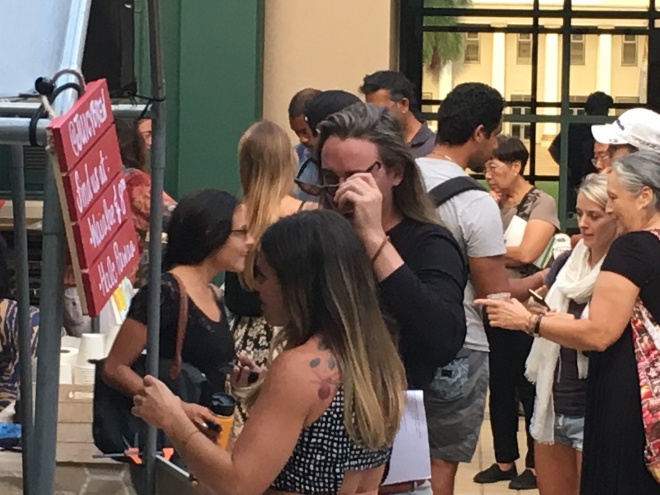
Lots of GMO cotton was being worn in the courtyard this evening. People were wearing t-shirts, jeans, sundresses, cargo shorts, and aloha shirts that were clearly made from biotech cotton. Not only was there a lot of cotton, Ashley Lukens, the director of CFS, pictured in the black and white jumpsuit was baring her tattoos and her freshly chemically treated hair too. She had a “Community Propaganda Education” table set up with all of her flyers touting that people were being poisoned by GMOs and pesticides. I had a feeling that she’d use this event to “inform” people about GMO ground zero.
Eventually, we finally got to enter the auditorium and find a seat to actually hear the panelists and the Food Babe herself. It started off with Ashley Lukens talking about how “f**king amazing” some people are and more curse words in front of all the young children sitting the the audience. I was appalled of how classless it was to openly swear knowing that young kids were in the audience. I thought it was inconsiderate to those parents who were there. But then again, this is how the anti-GMO folks forget to be considerate of others much of the time.
They were passing out cards to fill out any questions also. It was quite funny how these question cards somehow was passed around us and that when the basket came back, it was empty. I guess it was symbolic that in this cult-like atmosphere, questioning the authority is never tolerated.
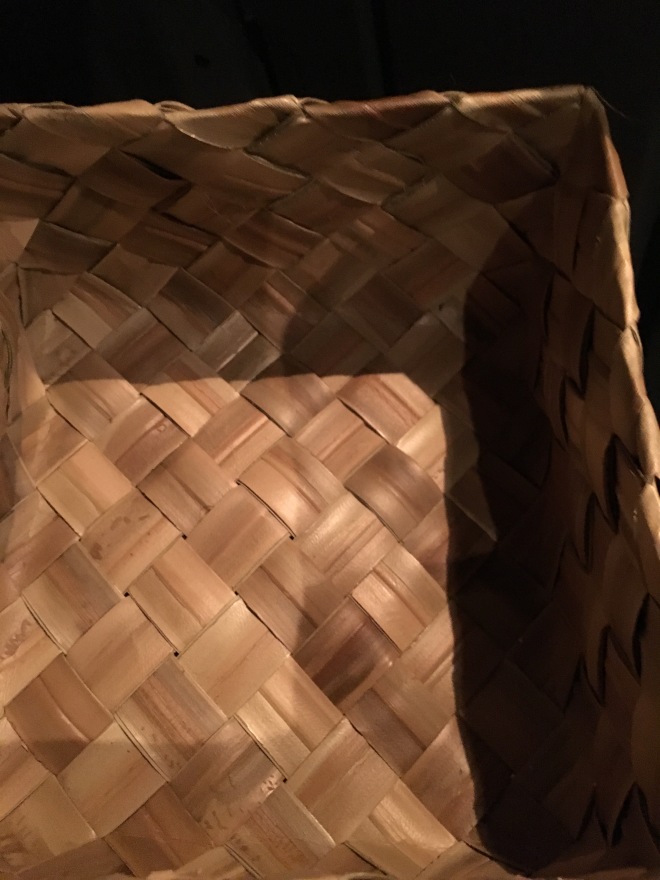
After Ashley gave her profanity laced introduction, Hanohano Naehu, from Molokai did a rap song about the evils of corporations and GMOs. The malama the aina bit came out and no pesticides got mingled in the lyrics too. The battle cry came out too that they had to protect people by fighting this perceived bad guy. He even decried that science was bad. I almost felt that I was in a church service where people start singing hymns to get the congregation going, especially when they’d get the crowd to throw in the “ea” chorus. He had some choice words put in his song too that were not appropriate for young children.
Then the panel started off with their stories about what brought them there. There was Kaui Sana, from Mao Organics, a Doorae Shin, from the Kokua Foundation, and the Food Babe herself. I honesty think that the most reasonable person on the panel was Kaui who talked about the need to return to the land and learn how to grow food. The stuff that Doorae was saying about veganism and her encouragement to watch movies to learn about food was typical preaching with no promotion of critical thinking. The Food Babe was doing her typical story of unhealthy eating led her on this mission, and how biotech is after her personally, and even how a Southern Kauai baby has liver cancer from pesticides. (She even had to throw in the dramatic cries too when telling the story of the baby. Problem is, there’s no GM farms in Southern Kauai, but the true believers don’t even think to ask.) The funniest thing she said was that she was glad she didn’t go to law school and became a food activist, likely knowing that it’s much more profitable.
I had to leave early from the event to get back to my kids but left the event really sad in many ways. How is it that a place of higher learning like the University of Hawaii can bring in a charlatan who takes advantage of people’s ignorance and fears under the guise of of “education?” It was an American studies professor that helped get the facilities to have her “preach” her message too. Meanwhile, the people at the College of Tropical Agriculture and Human Resources are doing work to develop better plants and methodologies as part of it’s mission as a land grant college. The law school, Hawaiian studies program, and now an American studies’ professor is participating in touting the anti-GMO rhetoric that can impede research and innovation. That is utterly disturbing to me at at time when Hawaii “intellectuals” were all talking about the need to do something about climate change.
The social justice warriors, backed with anti-corporate conspiracies and emotions, are all energized by how they feel and their need to feel like their saving the world with how they eat. The repeatedly say that they don’t need science and that they aren’t against science, which is truly sad. These folks are about how they feel and using simple ways, a heuristic, to make better decisions about what they eat and how they live. Food Babe is the preacher to the masses as we are seeing when she states things like don’t eat things you can’t pronounce or go organic. You’ll never see her talk about the physiology of eating, human metabolism, exercise, or other evidence based ways to become healthier or live better. She will never talk to people about DNA, plant breeding, crop protection, or basic farming either to encourage learning. People love her because she’s the simple way to better their lives without really having to think hard about it. She encourages others to just believe her and don’t question because everyone is attacking her and not her information. Any contrary information is all a conspiracy and media manipulation despite her being very much involved with those actually manipulating the media. Wanting to learn about science is condemned by people like Ashley and Vani.
I get it that people want to be healthy and what the Food Babe touts is easy to follow and boosts self esteems. Who doesn’t want to feel better about themselves? She really creates true believers that don’t think or question information to make good decisions. It’s just easier to go after things that they think are making them healthier with her Food Babe Army. She encourages people to go after companies and “change” them without even disclosing that she makes money each time she does that through affiliate links and other ways.
I feel like I lost brain cells tonight after listening to much of what was being said. I’ve also realized that this isn’t anti-science but more of anti-intellectualism. No one needs science is what activists always yell. From the TMT, to fishing, to GMOs, and any other issue, the science and facts are totally rejected. When we reject those objecting measures of what we are seeing, we can never find a common ground to work together from. There’s no critical thinking that will utilize a good rationale to help people think and problem solve together. They just want quick and easy solutions and a mob of believers is the way to do it.
Without an intellectual conversation about our world, we can’t solve the real problems at hand. Obscuring facts and impeding progress with conspiracies are only blocking innovation and genuine ways to address saving our planet. Though the Food Babe may make people think she’s making the planet better, she is actually contributing to problems by blocking progress and profiting from her efforts to misinform. Ashley Lukens and her Center for Food Safety followers are also impeding the world’s ability to do things better by attacking a technology that could make it cleaner. It’s all about what “they” eat and how it makes them feel better and nothing about what anyone else has to eat, which is a selfish, pompous way of thinking.
People involved in an intellectual movement will know some basic tenets on how to do things. They will research the issue well and learn all side of the it by talking to all parties. When it comes to Hawaii, they must consider the culture, people, and history to create a collaborative way to address the problem at hand. People involved must have a willingness to learn and work together to come up with a good plan for the future. They will seek facts and go to the sources to develop a plan based on those facts. The Center for Food Safety and the Food Babe clearly show that that they aren’t about intellect and creating a real plan to address their perceived problem.
As much as they claim to want to “help” Hawaii, the know nothing about agriculture and local ways when they give Vani a closed lei while being 6 months pregnant. It’s taboo to do that according to Hawaiian culture. Even the Hawaiian rapper didn’t even notice it on Vani either. She wore that lei all night.
I heard a great quote that social justice warriors tend to protest the things they know nothing about. Need evidence of it? Just look at the characters involved.
